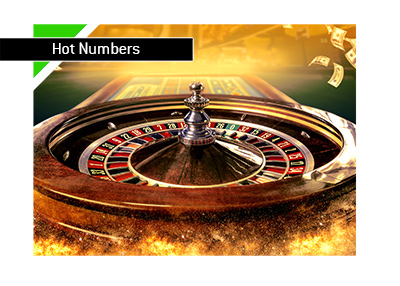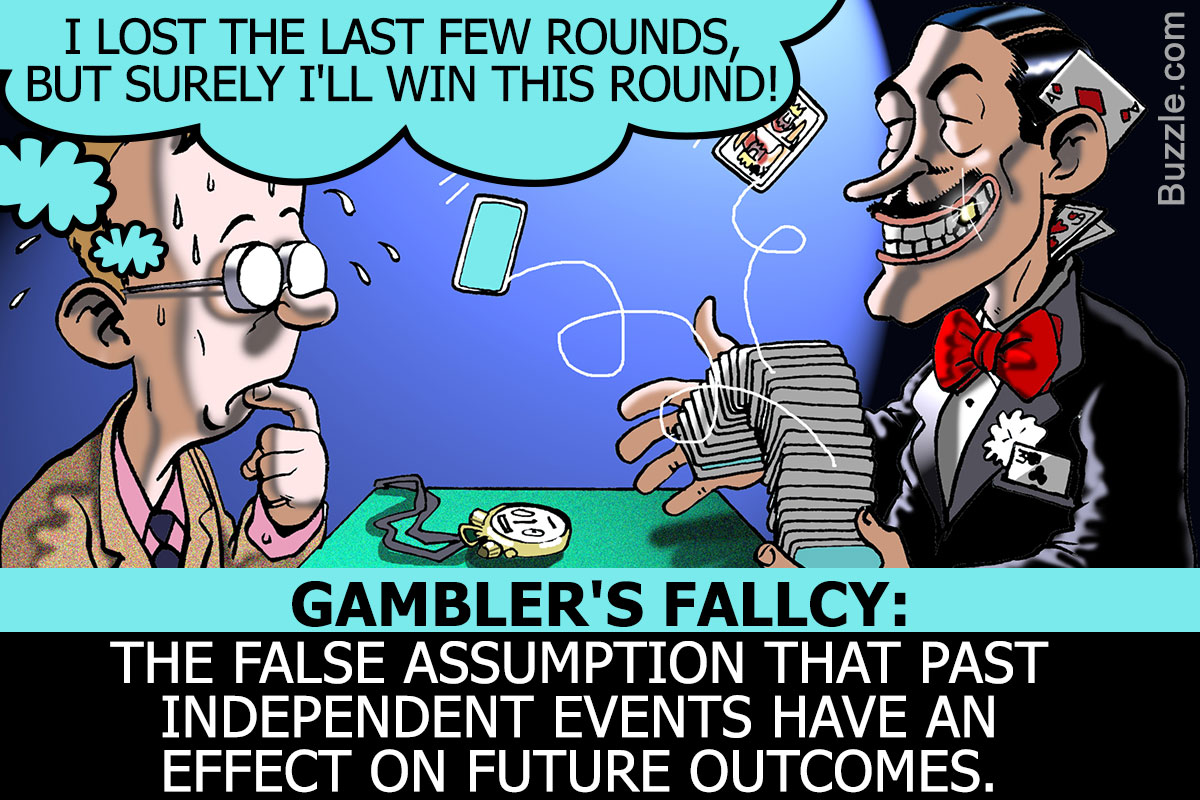Roulette Gambler Fallacy
Posted By admin On 03/08/22The Gambler’s Fallacy is the misleading belief that the probability of a specific occurrence in a random sequence is dependent on preceding events—that its probability will increase with each successive occasion on which it fails to occur.
Suppose that you roll a fair die 14 times and don’t get a six even once. According to the Gambler’s Fallacy, a six is “long overdue.” Thus, it must be a good wager for the 15th roll of the dice. This conjecture is irrational; the probability of a six is the same as for every other roll of the dice: that is, 1/6.
Chance Events Don’t Have Memories
In practical terms, the Gambler’s Fallacy is the hunch that if you play long enough, you will eventually win. For example, if you toss a fair coin and flip heads five times in a row, the Gambler’s Fallacy suggests that the next toss may well flip a tail because it is “due.” In actuality, the results of previous coin flips have no bearing on future coin flips. Therefore, it is poor reasoning to assume that the probability of flipping tails on the next coin-toss is better than one-half.


A classic example of the Gambler’s Fallacy is when parents who’ve had children of the same sex anticipate that their next child ought to be of the opposite sex. The French mathematician Pierre-Simon Laplace (1749–1827) was the first to document the Gambler’s Fallacy. In Philosophical Essay on Probabilities (1796,) Laplace identified an instance of expectant fathers trying to predict the probability of having sons. These men assumed that the ratio of boys to girls born must be fifty-fifty. If adjacent villages had high male birth rates in the recent past, they could predict more birth of girls in their own village.
There Isn’t a Lady Luck or an “Invisible Hand” in Charge of Your Game
Roulette Gambler Fallacy Definition
The Gambler’s Fallacy is what makes gambling so addictive. Gamblers normally think that gambling is an intrinsically fair-minded system in which any losses they’ll incur will eventually be corrected by a winning streak.
In buying lottery tickets, as in gambling, perseverance will not pay. However, human nature is such that gamblers have an irrational hunch that if they keep playing, they will eventually win, even if the odds of winning a lottery are remote. However, the odds of winning the jackpot remain unchanged … every time people buy lottery tickets. Playing week after week doesn’t change their chances. What’s more, the odds remain the same even for people who have previously won the lottery.
Gamblers fallacy originated from the roulette of Monte Carlo. The most well-known example this phenomenon happened from the game of roulette in the Monte Carlo Casino on August 18, 1913,5 as soon as the ball dropped in black 26 times in a row. The Gambler’s Fallacy. Roulette, like the first example above, is a game where this type of bias runs rampant. One reason for this is because the game is designed that way. Gamblers fallacy originated in the roulette of Monte Carlo The most famous example this phenomenon occurred in the game of roulette at the Monte Carlo Casino on August 18, 1913, when the ball fell in black 26 times in a row.
- In 1913, gamblers at the Monte Carlo Casino lost millions of francs at the roulette table. The ball would land on black, and the gamblers would bet on red. The ball would land on black again, and the gamblers would continue to bet on red. The ball landed on black 26 times in a row. The probability of that happening was 1 in 66.6 million.
- The gambler fallacy or a popular myth. The gambler's fallacy is a term of gambling terminology which the players can meet while playing different games including roulette casino game. It is considered to be one of the popular roulette myths. The other name for designation this term is Monte Carlo fallacy.
Gambler’s Fallacy Coaxed People to Lose Millions in Monte Carlo in 1913

The Gambler’s Fallacy is also called the Monte Carlo Fallacy because of an extraordinary event that happened in the renowned Monte Carlo Casino in the Principality of Monaco.
On 18-August-1913, black fell 26 times in a row at a roulette table. Seeing that that the roulette ball had fallen on black for quite some time, gamblers kept pushing more money onto the table assuming that, after the sequence of blacks, a red was “due” at each subsequent spin of the roulette wheel. The sequence of blacks that occurred that night is an unusual statistical occurrence, but it is still among the possibilities, as is any other sequence of red or black. As you may guess, gamblers at that roulette table lost millions of francs that night.
Gambler’s Fallacy is The False Assumption That Probability is Affected by Past Events
The Gambler’s Fallacy is frequently in force in casual judgments, casinos, sporting events, and, alas, in everyday business and personal decision-making. This common fallacy is manifest by the belief that a random event is more likely to occur because it has not happened for a time (or a random event is less likely to occur because it recently happened.)
- While growing up in India, I often heard farmers discuss rainwater observing that, if the season’s rainfall was below average, they worry about protecting their crops during imminent protracted rains because the rainfall needs to “catch-up to a seasonal average.”
- In soccer / football, kickers and goalkeepers are frequently prone to the Gambler’s Fallacy during penalty shootouts. For instance, after a series of three kicks in the same direction, goalkeepers are more likely to dive in the opposite direction at the fourth kick.
- In the episode “Stress Relief” of the fifth season of the American TV series The Office, when the character Jim Halpert learns that his fiancee Pam Beesley’s parents are divorcing, he quotes the common statistic that 50% of marriages wind up in divorce. Halpert then comments that, because his parents are not divorced, it is only reasonable that Pam’s parents are getting divorced.
The Gambler’s Fallacy is a Powerful and Seductive Illusion of Control Over Events That are Not Controllable
Don’t be misled by the Gambler’s Fallacy. Be aware of the certainty of statistical independence. The occurrence of one random event has no statistical bearing upon the occurrence of the other random event. In other words, the probability of the occurrence of a random event is never influenced by a previous, or series of previous, arbitrary events.
Idea for Impact: Be skeptical of most judgments about probabilities. Never rely exclusively on your intuitive sense in evaluating probable events. In general, relying exclusively on your gut feeling or your hunches in assessing probabilities is usually not a reason to trust the assessment, but to distrust it.
Wondering what to read next?
Although unpredictability is the true appeal of the games of chance and the unknown is what pumps up the adrenaline for most of us, there is a certain portion of enthusiasts who can’t seem to give up the idea of strategy and control, not even when it comes to Roulette, the game designed to incarnate the very concept of randomness.
Belief in a certain order of things and an illusion of control is of course an inevitable part of human existence and many feel that The Gambler’s Fallacy is no more than a flawed philosophy, extended to the wheel and the ball. Placing the series of random and unconnected events into a certain pattern is in the root of The Gambler’s Fallacy, but how much of the concept has any true value and is it actually possible to predict or at least narrow down the odds, is the question that has haunted the generations of gambling experts. In other words, does the wheel have a memory or are we just kidding ourselves?
What Exactly is the Gambler’s Fallacy?
The notion behind the Gambler’s Fallacy is that the frequency is closely connected to the probability. If a certain event has a higher rate of occurrence within a designated time period, it is less likely for the same event to keep happening over the course of time. The same concept works inversely – the longer the expected outcome was absent, the higher the probability it will start happening soon.
Although we often encounter this type of philosophy in various aspects of our life, Roulette is where the Gambler’s Fallacy is most comfortably settled. Interestingly enough, the very core of the Fallacy is denying the very core of Roulette – randomness.
Putting it very plainly, players who devote to this set of believes, feel that if a certain situation took place for more than an expected number of times, it will soon come to an end and be replaced with a different type of situation. The conclusion is based on a mathematical assumption of a numerical balance. If, for example, you decide to toss a coin, you start with an assumption that there are 50/50 chances of the coin landing on either side. Every landing of the coin on one side will in theory increase the chances of the coin landing on the opposite side. In reality however. It can happen that the coin lands on the same side every time it is tossed, even if we toss it 50 times in a row.
Why Order Can(not) be Applied on Roulette?
Roulette is the game where Gambler’s Fallacy has the highest potential of being exploited. Numerous track boards, charts and Hot and Cold numbers are all praying upon the innocent souls who place their faith into a higher order in the world full of random occurrences. But is that really the case? Experts who are utterly against Gambler’s Fallacy argue that every turn of the wheel is independent, but there are still others who claim that the laws of mathematical probabilities should not be disregarded – the very same laws that govern the Roulette wheel, whether we like it or not.
Even those who frown upon the The Gambler’s Fallacy agree that the ball as well as the numbers conform to the higher authority of mathematical probability – the discord between the two ideas may come from the number of occurrences within the group. The only way to predict the odds and the resting position of the ball is to conduct a survey on the large group of wheel spins and then draw your conclusion and form a pattern. On the other hand, one can also argue that since large group is no more than a structure consisting of smaller groups, same rules are applicable – what works for one will work for the other.
Final Thoughts
Roulette Gambler Fallacy Against
Therefore, is it not safe to assume that The Gambler’s Fallacy is just a slanderous name for (perhaps) a superficial grasp of the all governing laws of mathematical probability? Maybe the entire concept got a bad reputation simply because it came dangerously close to the truth, threatening to unveil that there is no such thing as the perfectly random wheel and that every little thing, including the Roulette and chance must yield to the laws of physics and mathematics? Not to mention the self-correcting principles integrated into the wheel design that contribute to the balance of the game, adding credibility to the Gambler’s Fallacy. Suffice to say that every system can be beaten one way or another and that nothing is flawless – be it the structure you are trying to disassemble by locating its weak spot or the strategy you use in order to do so. It just takes time.
YOU MIGHT BE ALSO BE INTERESTED IN THESE:
LATEST NEWS

Microgaming Announces Packed December Release Schedule [...]
Adventures Beyond Wonderland Released by Playtech [...]
NetEnt and Red Tiger Casino Games Now Available in Pennsylvania [...]
Roulette Gambler Fallacy Meaning
MORE INTERESTING ARTICLES
The New Megaquads Slot Mechanic [...]